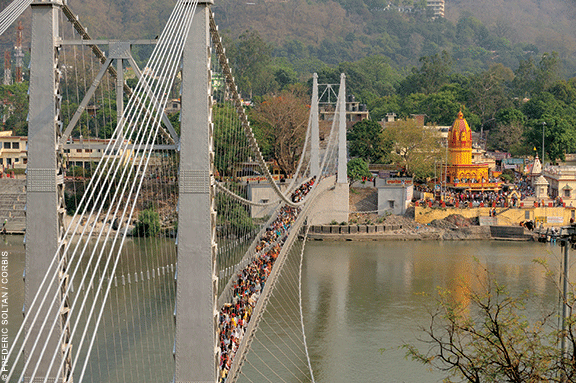
Finding Rishikesh, among all the other seekers.
By Steven Schwartzberg | Welcome to Rishikesh, India! Laxman Jhula, to be precise. If Hindus and Buddhists are right about reincarnation, I’ve been here before—that’s the kind of bone-deep resonance this place evokes.
Nestled in the foothills of the Himalayas, Rishikesh is an ancient holy area where the Ganges flows swift and strong. Because we’re relatively near her mountainous source, the river still sparkles green, less polluted than as she snakes her way further south. (“She”: Ganga is always female, often “mother,” and is revered by many not as a river, but a goddess.)
The city itself holds minimal appeal for tourists, who gravitate instead to the enclaves of Ram Jhula and Laxman Jhula, a few miles upstream. The Beatles, who arrived here in 1968 to study transcendental meditation with their guru, Maharishi Mahesh Yogi, put the area on the map for Western spiritual seekers. The Fab Four found a sleepy, forgotten area where crumbling ancient ashrams dotted shores peopled by local farmers, a handful of wandering sadhus, lots of cows, monkeys and water buffalo, and little else.
It’s hard to imagine that now.
Laxman Jhula has been like a circus for the 10 years I’ve been visiting, but now the midway tent is bursting at the seams. The streets swarm with scruffy Western backpackers, Mumbai hipsters, poor Hindu families on holy pilgrimage, and well-coiffed yoga practitioners willing to drop $200 a night for an “authentic ashram experience.” The backpackers—dreadlocked, pierced, tattooed—wear groovy, cheap “Indian” clothing that no actual Indians ever wear. The Mumbai hipsters, meanwhile, try as hard to dress like Westerners as the Westerners try not to do. Why doesn’t everyone just swap clothes? It would be so much easier.
It’s like a sleepy alpine village meshed with an over-the-top Bollywood spectacle, peppered with hearty dashes of P.T. Barnum, Baz Luhrman, and Mother Teresa. The sadhus, sannyasins, beggars, and orange-clad holy men are still here—wandering amid the hordes of Western devotees, ragtag hippies, and thrill-chasers who come to bungee-jump above, or whitewater-raft down, the sacred river. Temple prayers blare through scratchy amplifiers as CD vendors pipe slick devotional music into streets that already reverberate with lowing cows, motorbikes, and car horns. Bells ring to invoke gods and goddesses, loud wedding parties go until the wee hours, and monkeys mob the graceful steel-cable footbridges spanning the Ganges, angling to steal the tourists’ popcorn.
Even two years ago, you could still escape the mayhem by heading to the bucolic fields just above the town. But they’re gone now, filled with yet more hastily built guesthouses and curio shops. On the east bank of the river, where one row of buildings used to line the only road, structures now scrunch together like a Tetris game gone berserk, pushing up the hillsides four or five deep.
Clearly others love it here as much as I do, and if they’re drawn to bungee jump over a liquid goddess rather than attend satsang with a guru, who am I to judge? I avoid the smart new Coffee Day café (India’s answer to Starbucks) because I still like my masala chai in a small glass at a roadside stand of questionable hygiene—but I’ve been known to sneak into the trendy FabIndia clothing franchise every now and then.
Rishikesh has been “discovered.” It’s become a staple of the India-groovoid-travel circuit. As such, I’m not sanguine about the future here. It’s starting to homogenize with dozens of similar other Asian backpacker haunts—an unwelcome neutering of a place that relegates local essence to spice rather than main ingredient. But it still works, at least for now, because of the heady bounty of Eastern spiritual experiences on tap: gatherings with teachers, kirtan (chanting Sanskrit hymns), meditation sessions, constant yoga classes, and a pervasive vibe of spiritual pursuit and enthusiasm.
My days here are as full as I wish. A typical one might include Zen meditation training in the morning, satsang with a guru midday, and hmmm … what to choose in the afternoon … the Brazilian dance class with the Italian master? Tai Chi with the English practitioner? The daily lecture on non-duality with the Belgian monk everybody loves, including me?
It’s a thin line one walks here—not between the meandering cows and the racing motorbikes, but between the genuine thirst for spiritual nourishment and egocentric self-delusion.
Like other holy sites cum tourist havens, Rishikesh provokes an exploration of what it means to be “spiritual.” It’s normative here to be the disciple of a guru. Restaurants and shops display photos of the most popular gurus, much as Western establishments hang snapshots of movie stars (or is it how authoritarian regimes boast photos of the party leader?). Overheard café conversations are not about celebrity facelifts or politics, but the quantum nature of reality and the subtleties of cosmic consciousness. (Okay, plus this year’s Cricket World Cup. Some things transcend all boundaries.)
The ecstatic love-fest amid the devotees of the various teachers can feel intoxicating and healing, even redemptive. At the very least, many people here love feeling spiritual—an emotional state as distinct as anger, joy, or guilt. Yet how this emotional high merges into life is a trickier matter. Few of the seekers here quick to fall at the guru’s feet intermingle with, much less try to help, the main city’s teeming poor. I’ve seen devout yogis treat the local townsfolk with irritation or outright condescension. Funny, how a deaf-mute beggar can dampen one’s bliss. What a buzzkill.
Yet, the aroma of spiritual aspiration in the air, along with the incense, cow-dung, and masala spice, is strong enough that even those who don’t come explicitly for the spiritual smorgasbord are, I think, lifted by it. Strangers often greet each other with a smile and a namaste bow. The homeless man with no legs radiates such joy that I feel blessed whenever we meet, and admire the secret of his happiness. It’s common to fall into conversation with a pandit who will offer a blessing and share the story of how he walks between the worlds of the material and the divine. There is a presence that infuses this place with something transcendent, the way a hidden ingredient makes a certain dish sublime, even if you can’t identify exactly what it is.
One of the most popular teachers here, a Brazilian man named Prem Baba, is a guru out of central casting: radiant face, beaming eyes, beatific smile, long beard and grey hair, flowing clothes. His daily satsangs usually draw a few hundred people.
Like other teachers here, the gathering starts with chanting. One day when I attended, the musicians—guitar, flute, harmonium, tabla drums, singers—shifted after a few traditional Sanskrit bhajans into the familiar chords of the closest thing we have to a global anthem of peace: John Lennon’s “Imagine.”
Maybe it was the self-delusion of group intoxication. Maybe it was the fabulous Brazilian undercurrent of the instrumentation. Maybe it was nothing more than the sweet fragrance of a rose in a sealed room, masking the stench of rot outside. But that morning, sitting cross-legged with a few hundred people from across the planet on the floor of a Hindu ashram, chanting with our voices strong, intentions earnest, and hearts joyous, it was hard not to feel hopeful about life, about one another, about the future, about the ineffable, exquisite beauty of what, at least at rarified moments, is humanly possible. It was hard not to feel in love.
Imagine all the people living life in peace …
That’s why I come back over and over, and will until that last whiff of transcendence is snuffed out by the diesel fumes and sewage. In Rishikesh, holding the vision of a better world doesn’t feel like imagining. It feels possible, here and now, amid all the filth and contradictions. I wander the streets here love-struck, my feet barely touching the unpaved streets, happy in my newest collared shirt from FabIndia, as if I, too, can walk between the worlds.
Steven Schwartzberg C’80 can be reached at Steve_Schwartzberg@yahoo.com.




